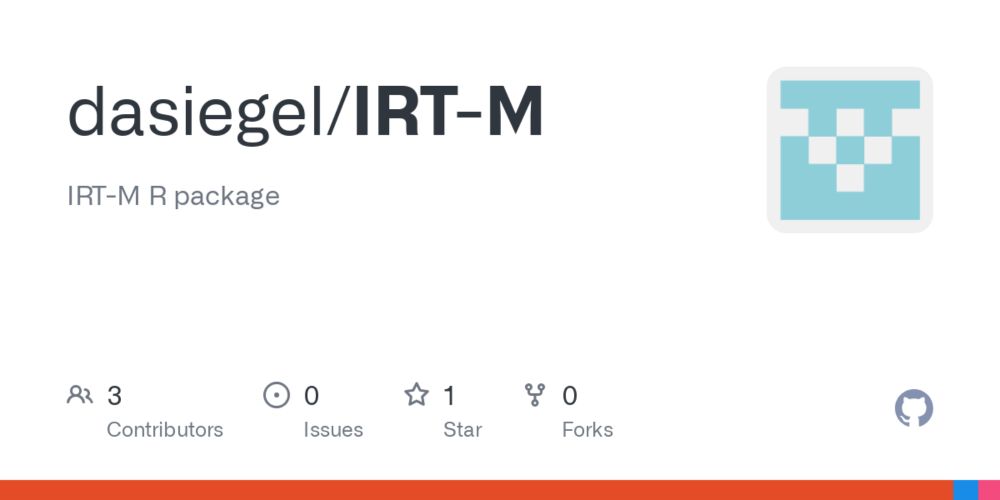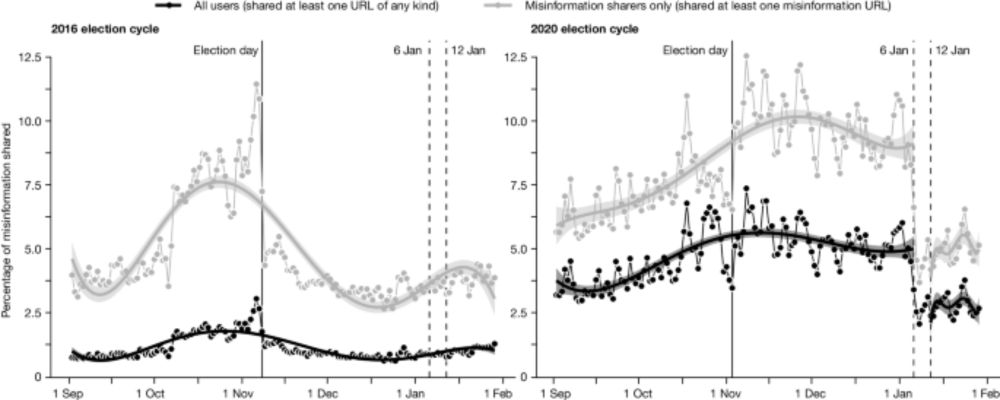Probably should've tagged this thread: #Polisky #PolScience
22.05.2025 15:29 — 👍 0 🔁 0 💬 0 📌 0
This was very much a group effort. Most of my co-authors aren't here, but I'll tag the amazing @margaretfoster.bsky.social. We hope this tool can be widely useful, and are happy to answer any questions you might have! (7/7)
22.05.2025 14:46 — 👍 2 🔁 0 💬 1 📌 0
Right now one needs to convert to binary input data to use IRTM, but we're also working on extensions to other data types. We provide a vignette in the package to walk the user through IRTM's use. (6/7)
22.05.2025 14:46 — 👍 2 🔁 0 💬 1 📌 0
Because you can run IRTM on large datasets with complex loading constraints, it opens up theoretically-driven measurement to a lot more contexts. We focus on the importance of matching measurement to theory in the paper, but are working on making clearer the range of uses in ongoing work. (5/7)
22.05.2025 14:46 — 👍 2 🔁 0 💬 1 📌 0
It's also user-friendly, requiring little coding or package knowledge: just give it input data and a constraint matrix for the pre-specification, and it will provide individual-level posterior distributions over latent dimensions. No need to learn any package-specific syntax. (4/7)
22.05.2025 14:46 — 👍 2 🔁 0 💬 1 📌 0
IRTM trades off some generality in specification, as packages such as brms or blavaan can achieve, for substantially increased speed: it runs on data with 10k respondents and 200+ items with 4 latent dimensions in about 10 minutes, regardless of the complexity of the pre-specified connections. 3/7
22.05.2025 14:46 — 👍 3 🔁 0 💬 1 📌 0
IRTM is a Bayesian implementation of an Item Response Theory model in a similar vein to other constrained approaches such as BCFA or BSEM: it allows the user to pre-specify connections between items/questions and theoretically-coherent latent dimensions. (2/7)
22.05.2025 14:46 — 👍 2 🔁 0 💬 1 📌 0
Happy to see that this is now out. The R package associated with the project, IRTM, can now be found on CRAN. Or can you still download it from my github. We'll continue to update it over time. This is a brief thread about what IRTM can do. 🧵 (1/7)
22.05.2025 14:46 — 👍 25 🔁 7 💬 2 📌 1
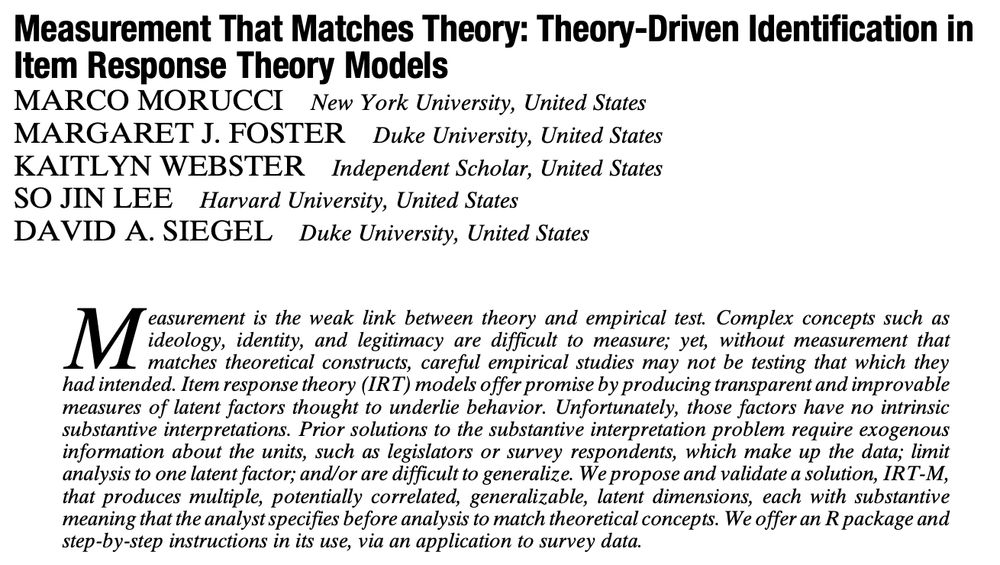
From our new issue: "Measurement That Matches Theory: Theory-Driven Identification in Item Response Theory Models" by Marco Morucci, Margaret Foster, Kaitlyn Webster, So Jin Lee, and David Siegel. #APSRNewIssue www.cambridge.org/core/journal...
20.05.2025 13:28 — 👍 8 🔁 2 💬 0 📌 1
🚩
27.12.2024 14:47 — 👍 1 🔁 0 💬 0 📌 0
Great news!
18.11.2024 18:26 — 👍 1 🔁 0 💬 0 📌 0
Thanks for this! I'd love to be added, if possible.
16.11.2024 13:49 — 👍 1 🔁 0 💬 0 📌 0
Thanks for putting this together! Would love to be added.
13.11.2024 11:05 — 👍 1 🔁 0 💬 0 📌 0
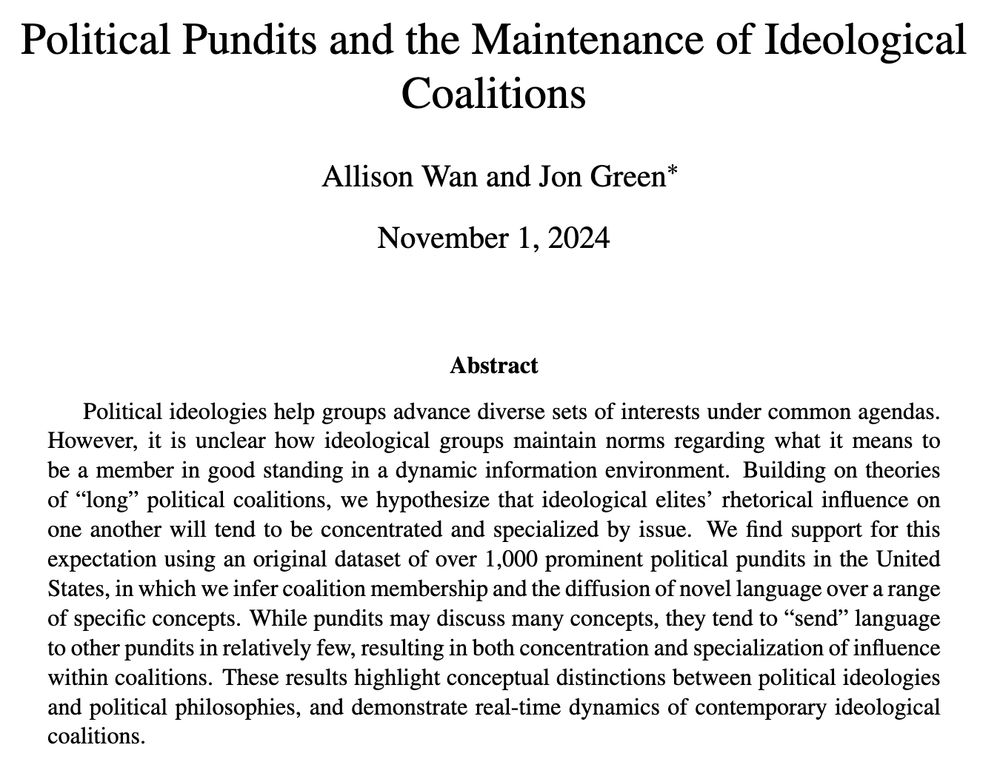
if you want a break from the election, we've posted a revision of our paper on pundits and ideological coalitions. bigger emphasis in this draft on the point that political ideologies aren't quite the same thing as political philosophies osf.io/xfy8r
01.11.2024 21:30 — 👍 8 🔁 3 💬 0 📌 0
I said this in my first-year grad research methods class, but it bears repeating. There are people who will tell you that you are not smart enough to understand something. Those people either don't understand the nature of intelligence, don't have your best interests at heart, or both. Ignore them.
27.09.2024 17:36 — 👍 9 🔁 1 💬 1 📌 0
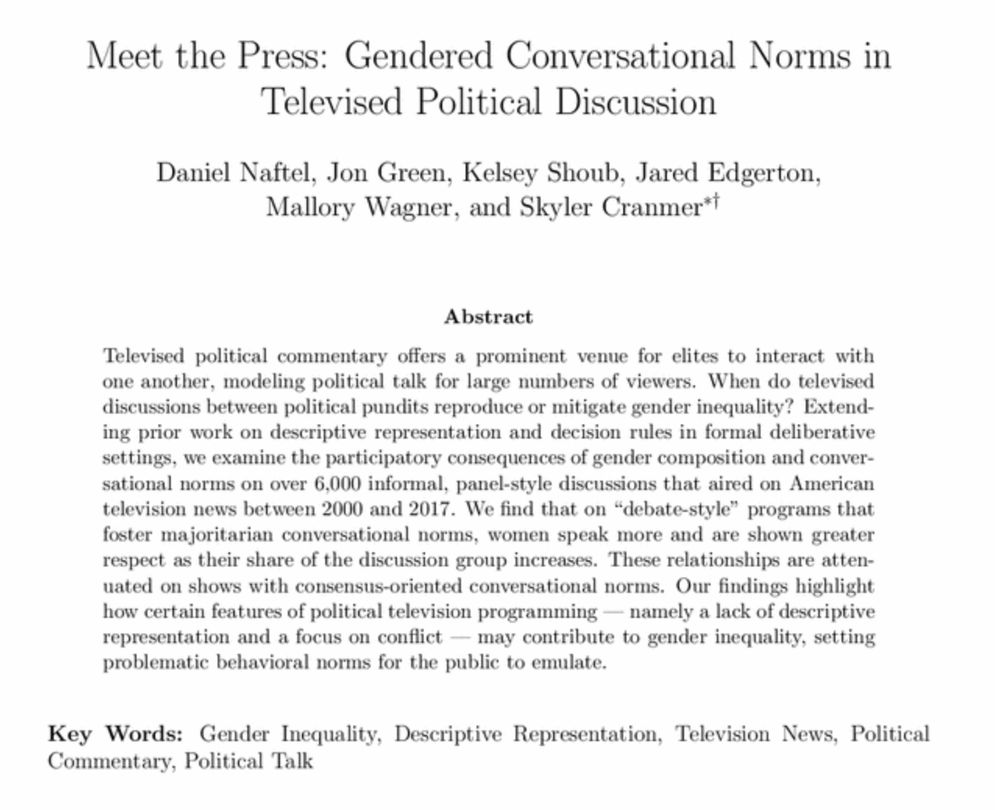
Paper title page (too long for alt text)
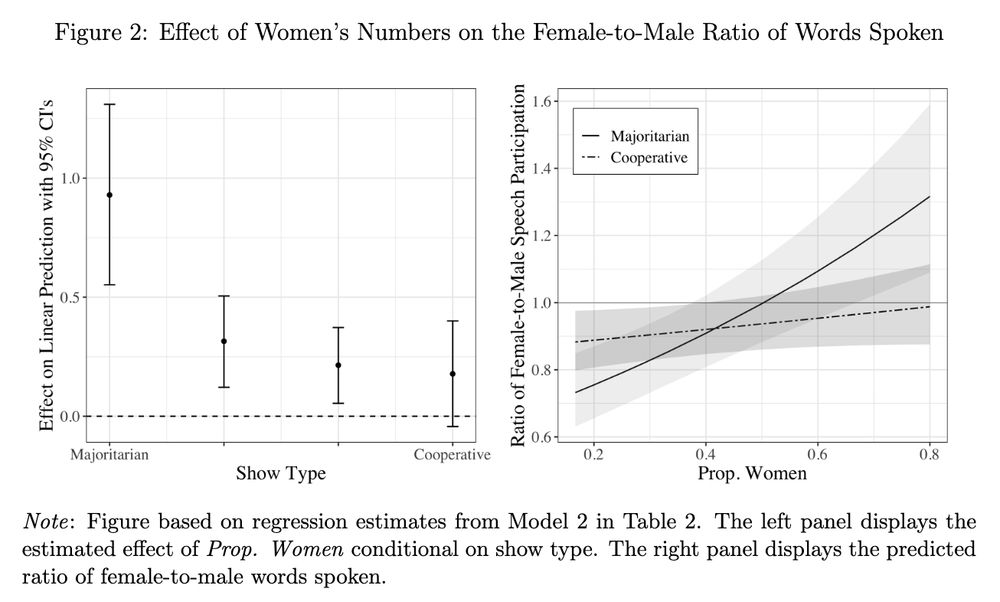
Figure 2: Effect of Women's Numbers on the Female-to-Male Ratio of Words Spoken
Just accepted at JOP w/ Daniel Naftel @kshoub.bsky.social, @jarededgerton.bsky.social, Mallory Wagner, and Skyler Cranmer. We find that patterns of gender inequality observed in formal deliberative settings extend to informal televised political discussions. www.journals.uchicago.edu/doi/10.1086/...
17.09.2024 23:37 — 👍 17 🔁 8 💬 1 📌 1
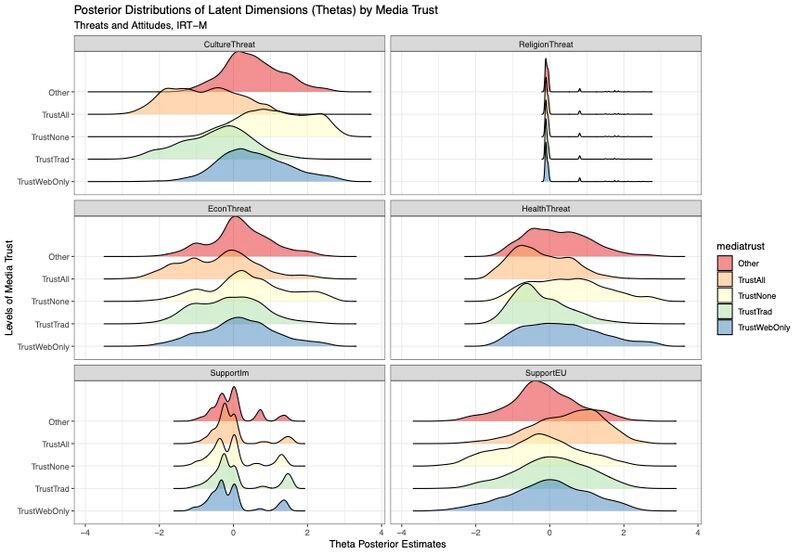
Distributions of latent perceptions of threats, grouped by attention to media.
Forgot the figure!
13.09.2024 16:24 — 👍 2 🔁 0 💬 0 📌 0
This is NSF-funded work, joint with Marco Morucci, Margaret Foster, Katie Webster, and So Jin Lee. None of whom are on Bluesky yet. (8/8)
13.09.2024 15:03 — 👍 2 🔁 0 💬 1 📌 0
We think the framework has the potential to help a lot of measurement problems. We’re working right now to extend the input data from dichotomous to multichotomous and continuous as well. It may be of interest to #econsky as well. (7/8)
13.09.2024 15:02 — 👍 1 🔁 0 💬 1 📌 0
There’s a lot more in the paper. For example, the figure shows how IRT-M can produce estimates of abstract concepts (sense of "threat", by the media sources that they trust) in data not designed to measure the concepts (the Eurobarometer survey). (6/8)
13.09.2024 15:02 — 👍 1 🔁 0 💬 1 📌 0
The package does the rest. The latent dimensions it captures can be correlated, and IRT-M discovers any such correlation from the data. The supervised steps ensure that the measures remain consistent across time and space. (5/8)
13.09.2024 15:02 — 👍 1 🔁 0 💬 1 📌 0
Then, researchers identify data sources and assess how the latent dimensions would show up in the data, which can depend on context. Then, they construct a constraint matrix that encodes dependencies between items in the data and the latent dimensions. (4/8)
13.09.2024 15:02 — 👍 1 🔁 0 💬 1 📌 0
We call this framework IRT-M, and it makes it easier for researchers to construct, measure, and present subtle or abstract concepts in their data. It’s a semi-supervised method. First, researchers identify theoretically meaningful latent dimensions. (3/8)
13.09.2024 15:01 — 👍 1 🔁 0 💬 1 📌 0
Measurement That Matches Theory: Theory-Driven Identification in Item Response Theory Models | American Political Science Review | Cambridge Core
Measurement That Matches Theory: Theory-Driven Identification in Item Response Theory Models
I’m pleased to announce to #polisky our forthcoming APSR article, “Measurement that Matches Theory.” In it, we introduce a Bayesian IRT framework that allows users to identify latent dimensions with substantive theoretical meaning. The paper is open access for now here: tinyurl.com/48ktz5jc. (1/8)🧵
13.09.2024 15:00 — 👍 26 🔁 9 💬 2 📌 0
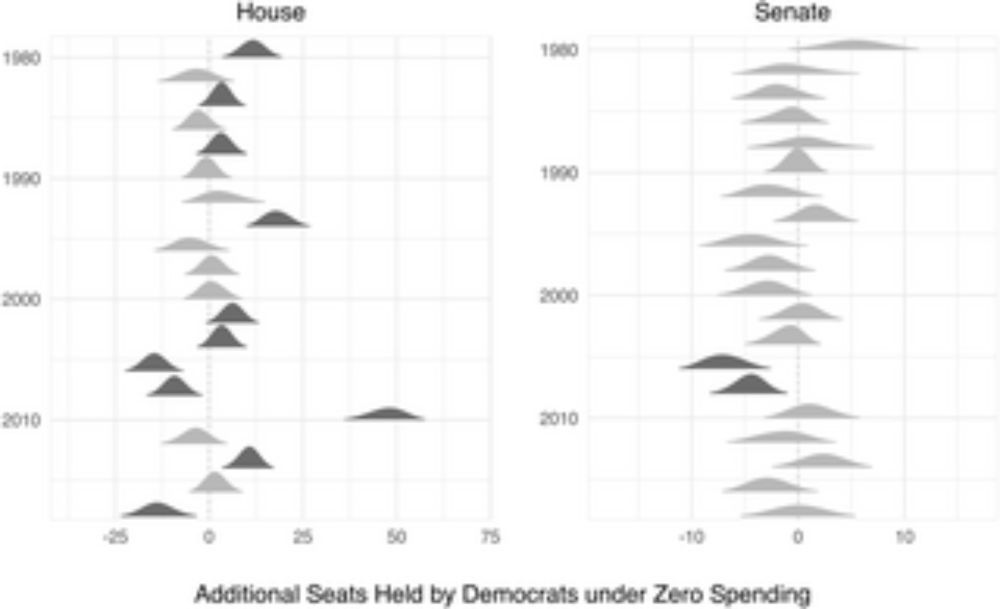
Can money buy control of Congress?
Can a political party spend enough across electoral campaigns to garner a majority within the U.S. Congress? Prior research on campaign spending minimizes the importance of campaign heterogeneity and ...
In case you don't want to watch the debate, but do want to think about elections, you can head over to journals.plos.org/plosone/arti... and check out our new paper on campaign spending (#polisky). We estimate the effects of money at the levels of both the individual campaign and the whole Congress.
28.06.2024 01:23 — 👍 1 🔁 0 💬 0 📌 0
Thanks, Charles!
16.05.2024 23:11 — 👍 0 🔁 0 💬 0 📌 0
Thanks, Brad!
16.05.2024 21:30 — 👍 1 🔁 0 💬 1 📌 0
(she/her)
Assistant professor of political science at Virginia Tech
clarahsuong.com
Professor of Political Science, George Washington University | American politics, judicial politics, Supreme Court, public opinion | https://blogs.gwu.edu/bartels
Husband and father. Proudly serving as Illinois’ 43rd governor.
U.S. Senator from Connecticut.
The premier scholarly research journal in political science. Read here: http://bit.ly/3fJQsoQ
At wired.com where tomorrow is realized || Sign up for our newsletters: https://wrd.cm/newsletters
Find our WIRED journalists here: https://bsky.app/starter-pack/couts.bsky.social/3l6vez3xaus27
Running for Congress (IL-09) because we deserve Democrats who actually do something | katforillinois.com
Professor in Comparative Politics @leuphana, party competition, European politics, CEE, democracy, corruption, radical right, former @IPZ_ch | PhD @IPWunibern #FirstGen
Asia-Pacific Security Chair, Hudson Institute &
Scholar in Residence, Carnegie Mellon University
Professor, Associate Chair & DGS @uwpolisci. Research interests: political economy, development, representation, migration, nonviolence, India (he/him) 🌈
Associate Professor, researcher, writer, advisor | humanitarianism, conflict, protection, IHL, health, migration & the Middle East | mostly 🇸🇾(+*) 🇱🇧 🇯🇴 | podcast co-host | #fulbright | emilykmscott.org
Previously MSF, Carter Center, UNDP, GAC,…
Professor of Social Statistics, Dept of Social Statistics, University of Manchester
Mitchell Centre for Social Network Analysis; Cathie Marsh Institute
networks • politics • statistics • public policy • complex systems
https://www.philipleifeld.com
13 yr old 👋
Nature loving photographer 📸🐦🦅🌱🔭
Scotland 🏴
Cartoonist. Creator of The Order of the Stick comic strip. New comics at random intervals.
Owner of Giant in the Playground - giantitp.com
Cross-disciplinary social & behavioral science research & fellowship in service of generating knowledge, illuminating understandings, building fields, informing policy discourse, & creating an enduring scholarly community like no other | casbs.stanford.edu
Political (Data) Scientist at Washington University in St. Louis. Data science, social media, American politics, and grumpy Bayesian. All opinions my own.
Historian of far-right extremism, writing a book about German & American neo-Nazis | Also: migration, racism, & sexuality in Europe/global | Author of Foreign in Two Homelands (2024) | University of Richmond | Ask me about fascism & my 3 cats
Founder & reigning monarch at TPM. Lapsed historian. Hand tool woodworker. Jew.




